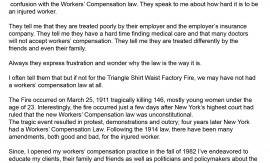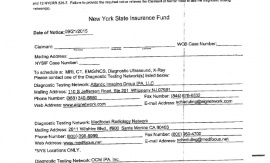The short answer to this all-important question is: Report Your Injury.
The Worker’s Compensation law has a two part statute of limitations.
Notice:
It is important to give notice of the injury or occupational disease to a person in a supervisory capacity. Giving notice to your coworker is unlikely to satisfy the requirements under the statute. Oral notice will work, but written notice is better. Many employers require written notice and actually have a rather harsh policy if notice is delayed.
Many times injured workers do not recognize the true nature or extent of the injury when the event occurs. I cannot tell you how many clients have explained to me that they knew they hurt themselves, but thought it would get better overnight or maybe over the weekend, only to find that the next day they couldn’t get out of bed. Sometimes formal notice is delayed because the supervisor is absent, sometimes because of the injured workers pride, and sometimes notice is delayed because of the worker’s fear of losing their job. All valid reasons in equity, but equity rarely carriers the day in a statutory system. If you’re hurt tell your supervisor immediately.
In cases of occupational disease the notice provision can be very confusing as the law actually provides a different analysis based upon the Date of Disability. The Date of Disability may or may not be the day that the injured worker learns of the occupational disease. Instead it may be the first day of lost time, which could be days, weeks, or even years after knowing that you have a disease or illness caused by your employment. However, it is best to give notice as soon as you know that you have an occupational disease.
Filing a Claim:
The Workers Compensation Board has many forms. While the law does not require a specific form be filed to commence a claim, it is likely that the Worker’s Compensation Board will not act until either a C-2 or a C-3 is filed.
Once the board has all the information they will “Index” the case. “Indexing” starts the formal clock running for the employer or insurance carrier to decide whether to accept or to controvert (deny) your Worker’s Compensation case. Sometimes, when the Board believes they do not have all the information they need, they may only “Assemble” the case, meaning that the Board has assigned a workers compensation board number (WCB#) but the clock does not start running against the employer or their insurance company. Generally speaking, if the case is “Indexed” the employer or the insurance carrier must make a decision within 25 days to accept or controvert the case.
William W. Crossett IV
Partner
Email: crossett@mcvlaw.com
Phone: 315-471-1664
Mr. Crossett concentrates his practice in the representation of Injured Workers. Since 1982, he has regularly appeared before the Workers’ Compensation Board and the Courts of New York. As an advocate for the Injured Worker, he has testified before the New York State Senate and has presented many Continuing Legal Education programs. Presently, Mr. Crossett serves as President of the Injured Workers Bar Association of New York and is an active member of Workers Compensation Law Division of the New York State Bar Association. Read more In 2012, he was inducted as a fellow in the College of Workers Compensation Lawyers. Mr. Crossett practices throughout Central New York with an office in Syracuse.
 MCV Law Email Sign Up
MCV Law Email Sign Up



When a new real estate purchase contract shows up on my desk I review it for...

















